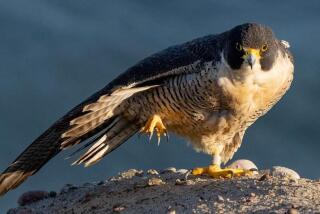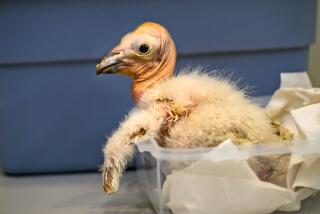Fund Trying to Save Birds From Extinction : Women to Care for Peregrine Falcons
- Share via
VICTOR, Colo. — For the next few weeks, Sherry McAllister of Irvine and her friend, Karen Schik of Minneapolis, will feed and watch three young male peregrine falcons that were transplanted to a cliff site near here earlier this month.
The Peregrine Fund, which is trying to bring the falcon back from the brink of extinction, raised the young birds from eggs at one of its breeding facilities.
The peregrine falcon, the world’s fastest bird of prey, became nearly extinct because of ingesting large quantities of DDT through its diet of small birds. The result was thin eggshells that cracked and broke when adult peregrines sat on them.
Last year, the Peregrine Fund placed 105 young peregrines at 23 sites nationwide. The birds usually are a little more than a month old when they are sent to various sites where volunteers help them establish a territory.
Until the peregrines reach maturity and can obtain their own food, it will be the job of McAllister and Schik to make sure the three birds get enough to eat.
The pair are “hack site attendants,” and they live on a rugged ridge 10 miles from this old mining town. The hack is a 3-foot-wide, 4-foot-deep cage with a wire screen wall giving the peregrines a view. The cage will be removed when the birds get their adult plumage and are ready to fly.
“Every day at 7:30 a.m., we feed the birds in the hack box (a tray or board is used to feed young falcons),” Schik said. “Then we’ll watch them to see if they’re eating and to see how they get along with each other.
“While one of us watches the birds, the other will watch the sky.”
Schik said the young peregrines have two major natural enemies, golden eagles and great horned owls. Owls don’t get up to the 9,000-foot elevation of the site, but eagles are a threat, she said.
Once the falcons get their plumage, the attendants’ main job will be to observe. They will bring food--normally one dead quail per bird per day--until the peregrines become proficient at killing small birds.
“We do get paid, but we aren’t getting rich doing this,” Schik said. “I think there is a real need for people to appreciate the wilderness and not abuse it. Part of that is getting the wildlife back where it belongs.”
More to Read
Sign up for Essential California
The most important California stories and recommendations in your inbox every morning.
You may occasionally receive promotional content from the Los Angeles Times.













